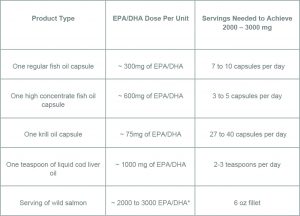By Anne-Marie Chalmers, MD
 Are you noticing results from your fish oil supplement? If the answer is ‘no’, it may be that you are not be getting enough of the anti-inflammatory omega-3 fatty acids to make a difference.
Are you noticing results from your fish oil supplement? If the answer is ‘no’, it may be that you are not be getting enough of the anti-inflammatory omega-3 fatty acids to make a difference.
Please take a moment to go grab your fish oil supplement, if you’re taking one, and then keep reading to learn how to get an effective omega-3 dose.
Determining Your Proper Dosage
Omega-3s are a family of polyunsaturated fatty acids (often abbreviated as PUFAs). The two most recognized members of the omega-3 family are called EPA and DHA. Since their discovery in the 1970s, EPA and DHA have been extensively researched for their role in fighting inflammation, promoting brain and eye health, and lowering triglyceride levels, to name just a few benefits.
To make a noticeable difference in your health, the daily omega-3 dose for most American adults should be between 2000 to 3000 mg of EPA and DHA combined. This level should be taken consistently, with food, for approximately 6 to 12 weeks before the effects will start to kick in.
Now, take a look at the label of your omega-3 supplement. Add together the total number of mgs of EPA and DHA per serving. How many capsules per day do you need to swallow to reach that 2000 to 3000 mg mark? For most brands, the actual dosage necessary is significantly higher than the normal serving size of 1 or 2 capsules.
Omega-3 Benefits Are Dose Dependent
Most Americans are deficient in omega-3s. It’s not just the lack of these fatty acids in our daily diet that creates the problem; it’s the plethora of inflammation-driving omega-6s that we get from processed foods. To experience anti-inflammatory benefits, most of us need a better balance of omega-6s and omega-3s.
Now, eating a few walnuts or chia seeds (both of which only contain ALA omega-3) is not going to correct that balance. Research demonstrates that the benefits of EPA and DHA are dependent on the dose administered. In fact, the anti-inflammatory benefits of the omega-3s don’t seem to kick in unless you consume at least 2000 mg every day. For certain conditions, like arthritis, and for people with high triglyceride levels, studies routinely use between 3000 to 4000 mg of EPA/DHA daily to see meaningful results.
Calculating the Right Serving Size
Many people take one or two capsule containing 1,000 mg of fish oil, thinking they are fulfilling their daily omega-3 requirements. But it’s important to know that fish oils and omega-3s are not the same thing. Fish oils typically only contain between 18 – 30% EPA and DHA, depending on the source of the oil. Therefore, the best way to know the amount of EPA and DHA you are consuming is to read the supplement label.
If you don’t have your omega-3 supplement in front of you, we’ve done the math for you by looking at some common products. Of course, products vary depending on the brand and the source of the oil. But, these numbers will give you the approximations for each category:
First and foremost, one teaspoon of liquid cod liver oil contains over three times as much EPA/DHA as one fish oil capsule. And, more shockingly, to get as much omega-3 as you would from eating a salmon fillet for dinner, you’d have to consume closer to 10 fish oil capsules daily. In other words, taking one capsule doesn’t give you much more omega-3 than a bite or two of salmon. No wonder people often experience few benefits from popping fish oil capsules.
Can You Take Too Much Fish Oil?
As mentioned above, most Americans have a long ways to go to correct their omega-3 deficiency. But if you do go on an omega-3 binge, the European Food Safety Authority has concluded that consuming up to 5000 mg of omega-3 daily is safe.
Feeling the Difference
For people taking omega-3 supplements for a condition, such as dry eyes, arthritis, depression, etc., strive for a daily dose of 3000 mg of EPA/DHA combined. And remember, besides dose, quality and consistency are also key to feeling all the benefits that fish oil has to offer.
About Anne-Marie Chalmers, MD
Anne-Marie Chalmers, MD, is the co-founder and president of Omega3 Innovations. Born and raised in the United States, Dr. Chalmers graduated from Brown University and completed her medical training at the University of Oslo in Norway. In Norway, Dr. Chalmers practiced emergency, family, and preventive medicine for many years. Her research and development work has included nutraceuticals (especially omega-3) and medical delivery device systems to facilitate ingestion of multiple medication combination.
Call Us 941-485-4400
www.omega3innovations.com
Check Also
Recurrent UTIs: Addressing the Risk of Antibiotic Resistance
Urinary tract infections (UTIs) are common bacterial infections that affect millions of individuals worldwide each …
 Central Florida Health and Wellness Magazine Health and Wellness Articles of the Villages
Central Florida Health and Wellness Magazine Health and Wellness Articles of the Villages



